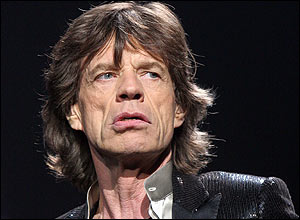
Note to the caption: They are too old to be boomers, but it wouldn?t have been the same without Mick Jagger (born July 26, 1943), above, or Bob Dylan (May 24, 1941). (JEFF CHRISTENSEN/AP)
Jun. 4, 2006. 07:50 AM
Why have these people born in the 1930s and early 1940s exercised such disproportionate influence? I can think of four possible reasons. The first is purely demographic. People in the Great Depression of the 1930s and the war years of the early 1940s were not having a lot of babies. "The 1930s was a great time to be born," says Daniel Stoffman, co-author with demographer David Foot of Boom, Bust and Echo. "It is always good to be part of a small age cohort. That benefits you all the way through life, from not having crowded classrooms and getting more attention from teachers, to entering the labour force when people are just desperate for labour."Albee looks back with fondness to the job he had as a Western Union messenger in the late 1950s. It was "a nice job," he recalls. "It kept you out in the air." Who knows what would have happened to his career if he hadn't been able to find a job to support himself in the years when he was trying to be a playwright, or if the only jobs available to him in this part of his life were gruelling or unpleasant?A second reason is that this generation was the last to grow up without television. This, of course, does not set it apart from previous generations, but it may well have given its cohort a decisive advantage over the following generation of baby boomers.Television, as we now know, has a hypnotic effect that destroys your mind. Well, more or less. The February 2002 issue of Scientific American reports the results of a survey of television viewers thusly:"Survey participants commonly reflect that television has somehow absorbed or sucked out their energy, leaving them depleted."The predominant mode of television is irony and discontinuity. This helps explain why the generation to first become addicted to television has proven to be, in general, less focused, less intense, less alert, and less serious than its predecessors.A third reason is that the generation of the '30s and early '40s took advantage of a unified culture that has since disappeared. The artists, writers and activists of this generation wrote and performed and argued before an audience that often saw the same movies, viewed the same newscasts, and read the same journalism. There is no equivalent today of cultural institutions such as The Ed Sullivan Show and Life magazine, which made conscious efforts to combine highbrow and middlebrow offerings ? Ed Sullivan introducing his audience to opera singers and dog acts, Life magazine offering profiles of Picasso and Marilyn Monroe. All this made for a very broad cultural conversation. The Beatles' appearance on Ed Sullivan, which everybody watched, reverberated throughout North America.By contrast, we are now in an age when people are encouraged to "personalize their use of the media" and to join "virtual communities." As Joey Kramer would say, people are "kind of doing their own thing." The coherence of cultural conversations, and the general sense of meaningfulness, is breaking down. It is unthinkable now that any audience could care as much, or believe that religiously in its music, as the audience members at the 1965 Newport Folk Festival that booed Bob Dylan for going electric. The fourth, and most significant, reason is that the generation of the '30s and early '40s came of age at a crucial turning point in human history. For 50 years apocalypse had been staring the Western world in the face ? two world wars, a Great Depression, the threat of communism. But then Western Europe made a surprisingly quick recovery from the war, at the same time as North America enjoyed exceptional prosperity. "We were more bright-eyed and hopeful for the future, breaking out of the leftover Victorian mould of attitudes and poverty and hardship," George Harrison said of The Beatles, in contrast to their elders. Good riddance to "poverty and hardship," the ancient companions of the human race. Good riddance to all the fears and restraints and taboos that go along with poverty and hardship. Time to enjoy! "What struck me throughout America and England was that so many people have found such novel ways of doing just that, enjoying, extending their egos way out on the best terms available; namely, their own," Wolfe reported in 1968.The generation born in the '30s and early '40s was at the forefront of this campaign to destroy old taboos, to eradicate the fears and restraints. For a while, it seemed an epic struggle ? taboos and fears and restraints die hard. An aura of heroism, of great projects of liberation, clung to their efforts. And those efforts did take courage and conviction. But by the early '70s, the battle had been won. The taboos were gone. And all we had left were "lifestyles," the religion of the baby boomers, with their extended egos. Whatever else this religion is, it is not a formula for greatness.
No comments:
Post a Comment